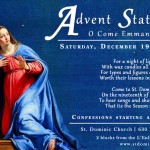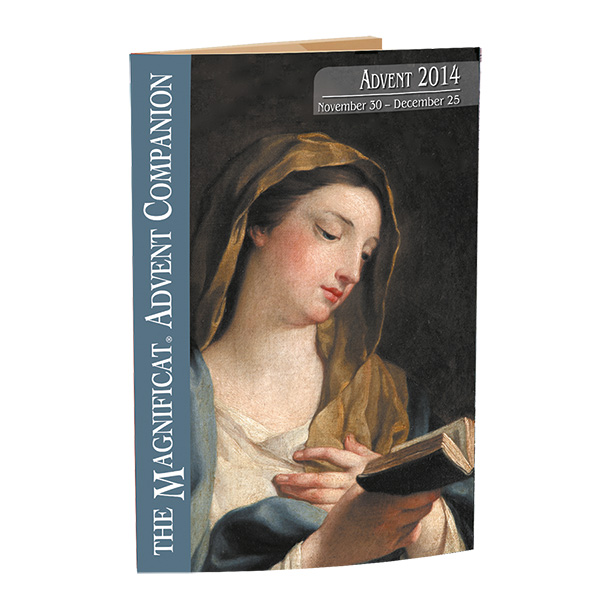Monday we celebrate the Solemnity of the Immaculate Conception of the Blessed Virgin Mary. “The fact of the Immaculate Conception introduces a possibility into the world that otherwise would have remained literally ‘inconceivable,’” Fr. Peter John Cameron, O.P., writes in his beautiful book on the Mysteries of the Virgin Mary. “With the event of the Immaculate Conception — that is, the raising up of a human being untouched by the scourge of sin — God’s tender love pierces the pall of human misery and evil,” he continues. “The fact of Mary’s fetal existence gives us every reason to rejoice in hope.”
Fr. Cameron explains that God endows Mary
with a capacity to know, love, and respond to Him that exceeds ordinary human capacities; and through Our Lady’s maternal mediation, he imparts those capacities to us.
As Pope John Paul II once explained it, Mary’s unique excellence in the world of grace and her perfection are fruits of the divine benevolence, which seeks to raise everyone to the perfection and holiness that are proper to the adopted children of God.
Mary, Mother of God and our mother, pray for us so that we might ever more deeply come to know, love and respond to your son, our Lord, Jesus Christ.
The Immaculate Conception is, of course, also, incredibly misunderstood.
As Dominican student friar Br. Vincent Ferrer Bagan, O.P., put it in an interview about the schola at the Dominican House of Studies in Washington, D.C., and their new music CD, Ave Maria: Dominican Chant for the Immaculate Conception:
The teaching of the Immaculate Conception is that the Mary, the mother of Jesus, was conceived in the womb of her mother, Anne, without the stain of original sin. This was a singular privilege granted to her so that she would be a worthy vessel for the incarnate Son of God in his incarnation.
We didn’t end it there.
Why, by the way, are Catholics often accused of worshipping Mary? Why, again, is this so misunderstood?
BR. VINCENT FERRER: The perception that Catholics worship Mary as if she were God can come from not understanding that Catholics believe that the saints are another part of the Church, in addition to the pilgrim Church on earth. While they have no need of our prayers or acts of charity, they are able to pray for us to God. Asking Mary or the saints to pray for us is a lot like asking our friends to pray for us, except that we know that Mary and the saints are in heaven and have a special and certain intimacy with God. The Church honors Mary and asks for her intercession in a special way, as she is the most perfect disciple of Jesus and, as we see in Jesus’ own words to the beloved disciple in the Gospel of John, has been given to all of us as our mother.
LOPEZ: Why is Mary so important to the Dominican friars of the Province of St. Joseph? Is it a St. Joseph thing?
BR. VINCENT FERRER: Besides being a Catholic thing, the Dominican order has always had a particular love for Mary. The accounts of our early history reveal that Mary had a desire for an Order of Preachers to be founded, and Dominicans have always seen ourselves as under her mantle. We are also the order through which the Rosary became the most popular Marian devotion in the Church. Though Marian devotion is certainly strong in the Province of St. Joseph, it is really a mark of the whole Order of Preachers.
You can read more from the good student brother here. And buy the music here.
Scott Hahn talks a bit about Mary (as he would!), in his new book, Joy to the World: How Christ’s Coming Changed Everything (And Still Does) and addresses the complaint some have that Catholics may “exaggerate the role of the Blessed Virgin.” Hahn writes:
it is history itself–salvation history–that has given her an outsized role. It is the Lord of history who cast her for such a part in the drama.
Her lines in Saint Luke’s Gospel add up to far more than a cameo appearance. The story of redemption turns on her brief dialogue with the angel. Heaven awaits her response. The Church has ever since echoed her prayer, the Magnificat.
Hahn points us to the prayer that appears in Luke 1:46-55, perhaps partially in the hopes that a reader might be overwhelmed by its beauty and adapt it as a daily prayer, if it isn’t already part of daily life. May it be our song, with Mary’s help, always pointing us to Jesus.
My soul proclaims the greatness of the Lord,
my spirit rejoices in God my Savior
for he has looked with favor on his lowly servant.
From this day all generations will call me blessed:
the Almighty has done great things for me,
and holy is his Name.He has mercy on those who fear him
in every generation.
He has shown the strength of his arm,
he has scattered the proud in their conceit.He has cast down the mighty from their thrones,
and has lifted up the lowly.
He has filled the hungry with good things,
and the rich he has sent away empty.He has come to the help of his servant Israel
for he remembered his promise of mercy,
the promise he made to our fathers,
to Abraham and his children forever.
Hahn writes:
Mary of Nazareth gave the Church–and every Christian–the model prayer of praise and thanksgiving. It is a model prayer for Christmas. She taught the world the proper response to God who has made his dwelling among humankind–who has made his dwelling in her flesh and in ours.
Saint Luke presents the Virgin of Nazareth as an icon of human freedom and human dignity. There is nothing obsequious about her. She is “troubled” by the angel’s presence, but she still dares to inquire. Hers is an active and intelligent obedience.
Tradition honors Mary as the “Virgin of Tenderness,” and she is tender. Yet the lines of the Magnificat also show us a fierceness of fidelity. It is a quality God cultivated in Israel, a quality that enabled a faithful remnant to keep faith in spite of exile and oppression.
All of Mary’s qualities are graces from God. In her we see grace in an extraordinary degree because of the way God prepared her for her unique vocation.
And here’s how Saint John Paul II ended his homily on this feast day in 1984:
To you, Virgin Immaculate, predestined by God above every other creature to be the advocate of grace and model of holiness for his people, today in a special way I renew the entrustment of the whole Church.
May you guide your children on their pilgrimage of faith, making them ever more obedient and faithful to the Word of God.
May you accompany every Christian on the path of conversion and holiness, in the fight against sin and in the search for true beauty that is always an impression and a reflection of divine Beauty.
May you obtain peace and salvation for all the peoples. May the eternal Father, who desired you to be the immaculate Mother of the Redeemer, also renew in our time through you, the miracles of his merciful love. Amen!
St. JPII also reminds us:
The Virgin’s “yes” to the announcement of the Angel fits into the reality of our earthly condition, with humble respect for the divine will to save humanity not from history but in history. Indeed, ever preserved free from all taint of original sin, the “new Eve” benefited uniquely from the work of Christ as the most perfect Mediator and Redeemer. The first to be redeemed by her Son, she shares to the full in his holiness; she is already what the entire Church desires and hopes to be. She is the eschatological icon of the Church.
Here’s a traditional prayer:
Mary, Mother of God, your greatness began at the first instant of your existence with the privilege of your Immaculate Conception. After Almighty God and the Sacred Humanity of Jesus, there is no being so great as you. It is true, you are a creature, and, therefore, far beneath the Supreme Being. But you are a creature so holy and so perfect that you are superior to all other creatures. You are above not only patriarchs, prophets, apostles, martyrs, and all the saints but even all angels. You stand alone on a throne of greatness and perfection far above the rest of creatures.
It was fitting that you, a Virgin Mother, should conceive the Man Who was also the Son of God. It was fitting that you should be adorned with the greatest purity ever possible to a creature. You are the Virgin to whom God the Father decreed to give His only Son—the Divine Word, equal with Himself in all things—that entering the natural order He might become your Son as well as His. You are the immaculate Virgin whom the Son Himself chose to make His Mother. You are the immaculate Virgin whom the Holy Spirit willed to make His bride and in whom He would work the tremendous miracle of the Incarnation. The privilege of the Immaculate Conception was suitable to your dignity. It was possible for God to confer it, and He did confer it!
Mary, My Mother, help me to imitate your sinlessness by keeping my soul free from every willful sin by the faithful observance of God’s commandments. Help me to imitate your fullness of grace by receiving Holy Communion frequently, where I shall obtain the sanctifying grace that will make my soul holy and pleasing to God, more like your own, and where I shall obtain the actual graces I need to practise virtue and to walk in your footsteps. Through prayer may grace fill my soul with the life of God and transform me into a living image of Jesus, just as you were.











